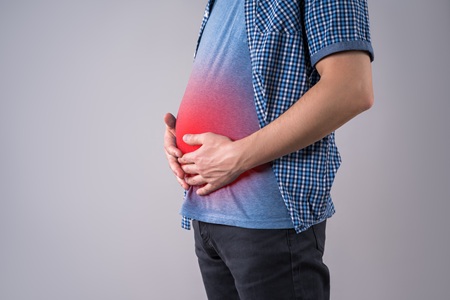Bloating is a common and often uncomfortable condition that occurs when your abdomen feels full or tight, sometimes accompanied by visible stomach swelling. This sensation is typically caused by excess gas in the gastrointestinal tract, though other factors may also contribute. Understanding what bloating is and its various aspects can help manage and prevent this condition effectively.

Stomach bloating refers to a feeling of fullness, pressure, or discomfort in the abdomen. It can affect people of all ages and is often linked to dietary choices or digestive health. While mild bloating is common, persistent or severe cases may indicate underlying health issues.
Bloating can be more than just a temporary annoyance as it often comes with a combination of symptoms that can vary in severity:
Several factors can contribute to bloating, including dietary habits, medical conditions, and lifestyle choices. Common causes of gas in stomach and bloating include:
Consuming large meals can stretch the stomach and lead to discomfort.
Certain foods like beans, lentils, and carbonated drinks can increase gas production.
Eating too quickly or talking while eating may cause air to enter the stomach.
Conditions like lactose or gluten intolerance can trigger bloating.
Abdominal bloating may be a symptom of irritable bowel syndrome (IBS), constipation, or other gastrointestinal disorders.
For chronic bloating, medical intervention may be necessary. Common bloating treatments include:
Over-the-Counter Medications: Antacids, simethicone-based products, and stomach gas medicine can provide relief.
Dietary Adjustments: Working with a dietitian to identify and eliminate trigger foods.
Medications for Underlying Conditions: Treating IBS, acid reflux, or other digestive disorders.
Probiotics: Beneficial bacteria that support gut health and may reduce bloating.
Looking for effective home remedies for bloating? Here are some simple, natural options to try:
Ginger Tea: Known for its digestive properties, ginger can relieve gas and bloating.
Peppermint Oil: This essential oil may help relax the digestive muscles.
Fennel Seeds: Chewing on fennel seeds can reduce gas and ease abdominal discomfort.
Warm Compress: Applying heat to the abdomen can relieve muscle tension and gas pain.
1. Practice Mindful Eating
Eat slowly and chew your food thoroughly. This not only aids digestion but also minimizes the amount of air swallowed during meals, a common cause of bloating.
2. Opt for Smaller, Frequent Meals
Large meals can overwhelm your digestive system, leading to bloating. Instead, eat smaller portions more often to keep your digestion smooth and efficient.
3. Limit Gas-Producing Foods
Cut back on foods that are notorious for causing gas, such as beans, broccoli, cabbage, and carbonated drinks. If these are part of your diet, introduce them gradually to let your gut adjust.
4. Stay Hydrated
Drink plenty of water throughout the day. Proper hydration aids digestion, prevents constipation, and reduces bloating. Avoid sugary or fizzy drinks, which can worsen the problem.
5. Incorporate Fibre Gradually
Fibre is essential for digestion, but a sudden increase can cause bloating. Add fibre-rich foods like fruits, vegetables, and whole grains to your diet slowly to let your system adapt.
6. Avoid Swallowing Excess Air
Steer clear of habits like chewing gum or drinking through straws, which can cause you to swallow air and lead to bloating.
7. Stay Active
Regular physical activity can stimulate digestion and help release trapped gas. Even light exercises like walking after meals can make a noticeable difference.
8. Manage Stress
High stress levels can disrupt digestion and lead to bloating. Incorporate relaxation techniques like deep breathing, meditation, or yoga into your daily routine.
While occasional bloating is normal, persistent or severe bloating can indicate more serious health concerns. Consult a gastroenterologist if you experience the following:
Bloating is a manageable condition that can often be alleviated with dietary changes and natural remedies. However, persistent issues may require medical attention. Whether it’s finding bloating remedies or understanding reasons for stomach bloating, being proactive is key to maintaining digestive health.
If you’re dealing with chronic bloating or gas, consult a healthcare professional to explore effective bloating treatment options tailored to your needs.
What is the main cause of bloating?
Bloating is often caused by excessive gas in the digestive system or the retention of water in the abdomen. Common culprits include consuming gas-producing foods like beans or carbonated drinks, eating too quickly, food intolerances, constipation, hormonal changes, or digestive disorders like irritable bowel syndrome (IBS).
How to ease bloating?
To ease bloating, you can try the following:
Can UTI cause bloating and gas?
Yes, a urinary tract infection (UTI) can sometimes lead to bloating and gas. This happens because the infection causes inflammation in the urinary and nearby digestive systems, which may disrupt normal digestive processes. Additionally, antibiotics used to treat UTIs can sometimes lead to bloating as a side effect by disturbing gut bacteria.
How to solve bloating fast?
To quickly relieve bloating: